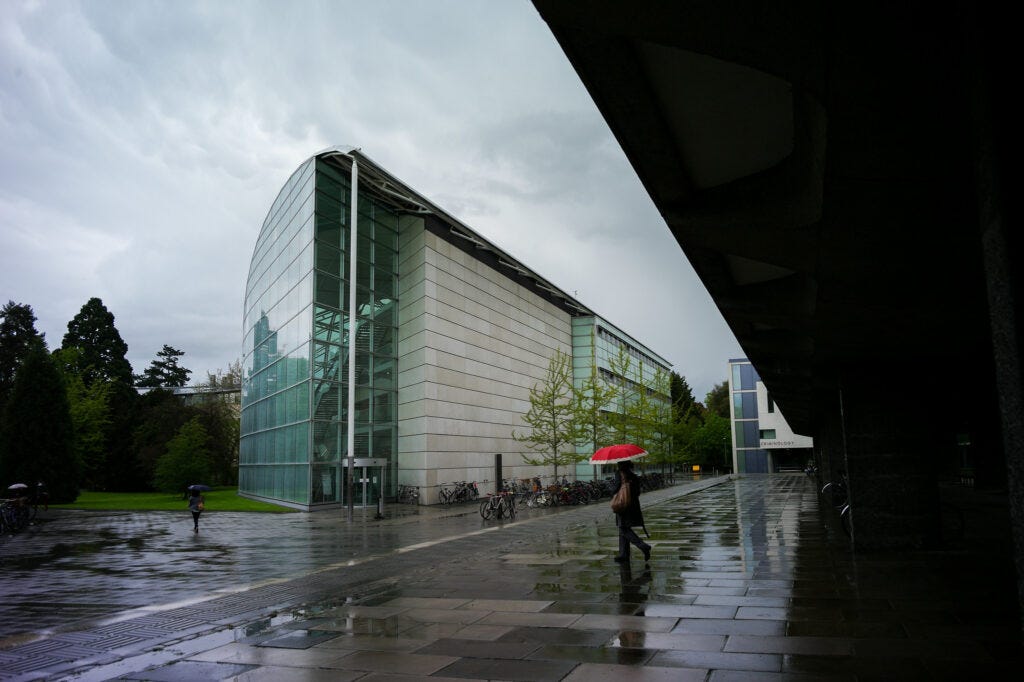Sunday 13 December, 2020
Any port in a storm
The Law Faculty building in Cambridge (now the Sir David Williams Building after my late friend and mentor). It always reminds me of a beached cruise liner.
Quote of the day
“Boats against the current are the only kind I should choose to embark on; the going’s tough, but your fellow passengers are better company than you will ever find going with the flow.”
Frederic Raphael
Musical alternative to the morning’s radio news
“The Thrill Is Gone” | BB King, Eric Clapton, Robert Cray and Jimmi Vaughn
Finally, the British government has a good idea
This morning’s Observer column:
On Tuesday, in a rare break with recent practice, a branch of the UK government did something clever. The Competition and Markets Authority (CMA) outlined plans for an innovative way of regulating powerful tech firms in a way that overcomes the procedural treacle-wading implicit in competition law that had been designed for an analogue era.
The proposals emerged from an urgent investigation by the Digital Markets Taskforce, an ad hoc body set up in March and led by the CMA with input from the Information Commissioner’s Office and Ofcom, the telecommunications and media regulator. The taskforce was charged with providing advice to the government on the design and implementation of a pro-competition regime for digital markets. It was set up following the publication of the Treasury’s Furman review on unlocking digital competition, which reported in March 2019 and drew on evidence from the CMA’s previous market study into online platforms and digital advertising.
This is an intriguing development in many ways. First of all it seems genuinely innovative – unlike this week’s antitrust lawsuits brought against Facebook in the US…
If this survives the ‘consultation’ (i.e. lobbying) phase and makes it onto the statute book, then things could get interesting.
The Facebook Oversight Theatre Show goes live
In an entertaining Guardian report a member of Facebook’s ludicrous ‘Oversight’ Board says that it “won’t shy away” from tackling Trump-style disinformation.
This month, the 20-member board – made up of academics, lawyers, politicians and journalists from across the world – announced the first six cases it would review over the next 90 days.
One of the cases involves a two-year-old post of an alleged quote from Joseph Goebbels, the propaganda minister of Nazi Germany. The post, which spells out the need to appeal to emotions and instincts, instead of intellect, and on the unimportance of truth, was removed by Facebook for violating its policy on dangerous individuals and organisations. The user who reshared the post has appealed on the grounds that Trump was, in their view, following a similar fascist model.
The Board’s remit is limited to content that has been removed by Facebook. Its sole Australian member, Nic Suzor, admitted to the Guardian that this is likely to be “problematic” when it comes to addressing disinformation posted by politicians, such as US president Donald Trump posting false information about election fraud. Currently Facebook puts warning labels on this kind of post, rather than removing it. “The only way that we can handle cases where Facebook has decided not to remove something is if Facebook refers it to us,” he said.
Writing in the Columbia Journalism Review Tow Center Director Emily Bell was distinctly underwhelmed by this charade:
In today’s information ecosystem, technology platforms like Facebook are not just the arbiters of truth; they are also the setters of norms, the weather vanes of taste, and the guardrails of democracy. And, in an increasing number of places, they are the instruments of oppression. As such, perhaps the most striking feature of the board’s first set of cases is the lack of ambition in their subject matter.
If a panel of global experts really needs three months to decide if it is acceptable to show a naked boob in pursuit of cancer prevention, then the Oversight Board’s hope of creating lasting impact is doomed from the outset. Issues of contextual nuance might represent interesting cases, but they are not “hard” in the way that, say, the mass removal of posts in compliance with repressive speech laws is hard. Yet cases concerning the latter are unlikely ever to reach the Oversight Board. In fact, in the board’s charter, Article 2, on the “scope” of the board’s activities, states: “In limited circumstances where the board’s decision on a case could result in criminal liability or regulatory sanctions, the board will not take the case for review.” In other words, if a removal is in compliance with the law of a country, then it will not be reviewed.
On the same day the Facebook Oversight Board launched, Amnesty International published a damning report on how aggressive new censorship laws in Vietnam are stifling citizens, the free press, and activists—with the compliance of technology companies like Google and Facebook. Facebook reports a 983 percent increase in content restrictions in Vietnam since the tightening of laws in April, pushing the number of restricted and deleted posts up from 77 to 834 in the space of a year.
This Board is rather like the ‘ethics’ boards that companies are setting up in a desperate attempt to avoid legal regulation. What those boards do is Ethics Theatre. By setting up this ludicrous board, Facebook is now engaging in Oversight Theatre. Quelle Surprise!




